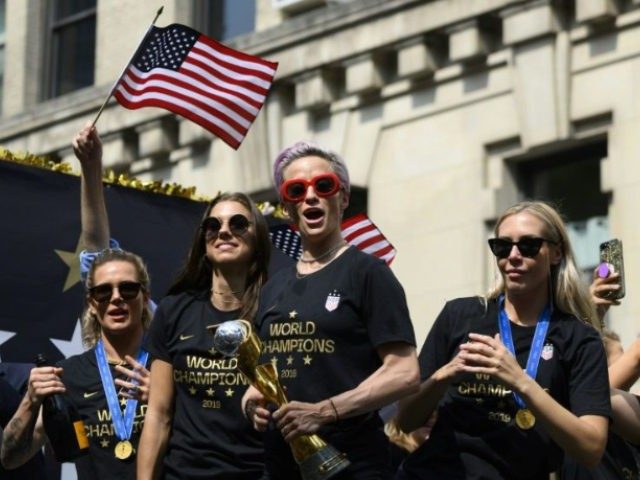Time magazine has named the World Cup-winning U.S. Women’s soccer team as its 2019 “Athlete of the Year.”
The magazine bestowed the award on the team as a group, but in it’s write up of the decision, Time also highlighted stars, Alex Morgan, Carli Lloyd, and Golden Ball and Golden Boot winner Megan Rapinoe.
Time was especially ebullient over the several team members and their extreme political activism.
“Sports tends to be thought of as an escape from the tumult of life beyond the field. And there are few things more enthralling than a brilliant goal, a sudden-death shoot-out, a last-second Hail Mary,” Time wrote in its presentation. “But if you look closely, our diverting games are often an engine of change in the messy world outside the arena.”
That “engine of change,” naturally, is some of the team members’ agitation for “equal pay” in U.S. Soccer.
That much has long been apparent to the members of the U.S. women’s national team, who have historically made less and been treated worse than their male counterparts. The stories of the inequities are passed down from generation to generation on the team: the cramped travel and bug-infested hotel rooms in the ’80s and ’90s; the shoddy field conditions in the 2000s; and a bonus system that left the women with inferior earning opportunities, despite their superior results.
So after various efforts to resolve the pay dispute failed, the team sued their bosses for gender discrimination on March 8 of this year—International Women’s Day. Before they even set foot in France, the favored U.S. women were already playing for more than a trophy.
Indeed, Time celebrated the team for using its appearance in the Women’s World Cup in July, not as a platform merely to show sports excellence, but as a platform to protest against America, campaign for equal pay, and attack President Donald Trump.
“Through it all, the team kept showing the world how to have a good time. And they allowed everyone else to share in their fun. Two days after President Donald Trump took aim at Rapinoe on Twitter for saying she would skip a White House visit if they won, she scored a pair of goals against France and marked them with a pose — arms outstretched, chin lifted in defiance — that served as its own rebuttal,” the magazine wrote.
Time went on to praise Rapinoe and the rest of the team for continually advocating for their politics even as they played, and won, the Women’s World Cup games in France.
As the magazine wraps up its recounting of the team’s actions in France, Time ends its retrospective insisting that the U.S. Women’s team has had great impact on America.
But no matter how the team fares, its impact on American culture is secure. Through their athletic excellence and legal persistence, the team represents a natural extension of what Title IX—the landmark legislation ensuring equal access to sports—began in 1972. “It’s not enough to say, ‘Let women play soccer,'” says Koller. “Now, it’s ‘Treat women the same.'”
The team, which made that case so dazzlingly on the field in France, welcomes the weight of legacy. “This next generation wants to be a part of something big,” says Morgan. “They’re not just sayers. They’re doers. It’s our job to continue to pave the way.”
Like Sports Illustrated, which picked Megan Rapinoe for its Sportsperson of the Year mostly because of her political activism, Time was agog over the team’s left-wing activism. But not so much their excellence at sports.
Follow Warner Todd Huston on facebook.com/Warner.Todd.Huston.

COMMENTS
Please let us know if you're having issues with commenting.